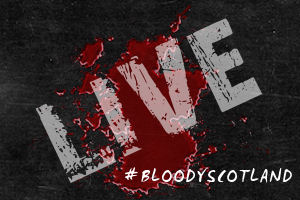Never knowingly understood
That's 'real' literature for you. The kind that wins - or at least is permitted to sit on the shortlist of - the Man Booker award.
You could be forgiven for thinking the Edinburgh International Book Festival had taken over Bloody Scotland, when its director Nick Barley hosted The BIG Debate: Would you kill to win the Man Bloody Booker?
They said a lot of things in that debate, but never really got round to discussing actually killing for the award. That's either because they are such lovely people, those crime writers, or because the prize isn't worth it.
Willy Maley and Stuart Kelly were there to speak up for the purity of the Man Booker, while Ian Rankin and Peter James had the task of putting forward the reasons why crime fiction should be allowed to win the Man Booker as well as the next literary novel.
We started out with a minority of three in the audience, supporting the current rules for no crime on the shortlist. Once Willy and Stuart had done their jobs, even Ian and Peter were beginning to wobble. A quick poll at the end gave us twenty supporters for no crime writers for the Man Booker, meaning the against side had done the better job and were declared winners.
But it's worth remembering that a good many crime novels have won the award already. It's just that no one labelled them as crime. It helps if the title contains the word snow. It's more literary, snow.
When Nick asked the panel who they think should win a crime based Man Booker they listed authors such as Ruth Rendell, John le Carré and Sophie Hannah. All good suggestions.
Post by Ann Giles
Refined, restrained evil
Some early morning evil never goes amiss, and what better way to start the day than with Denise Mina and Peter James comparing evil with Alan Riach and each other?
After brief introductions from Alan on who they are (and who needs that?), they both read from their books. Peter said he's famous for short chapters, so would read chapter one from his new book, which took all of ten seconds. On that basis Denise allowed him another 19 chapters.
Denise checked whether there were any children in the audience, but although the coast appeared to be clear she still stopped reading as she got to the orgy, which was most disappointing.
They discussed where they draw the line, because everyone is different, and also investigated what counts as rape. The law says one thing, but morally you might not agree.
Peter has experience of Broadmoor, but only as a visitor, and on inspection it seems as if certain tabloids might actually count as more evil than the worst psychopaths. Evil is an unwillingness to understand.
Asked whether it's important for good to conquer evil, it appears this is not always necessary, and many readers prefer realism to happiness. Sock puppets turned up once more, and we found out that authors write their own blurbs, telling the world how excellent they are, much in same vein as the infamous puppets.
Not knowing how a book will end is something Denise experiences every time. Peter knows where he's going to end up, but also knows he will change his mind.
Post by Ann Giles



